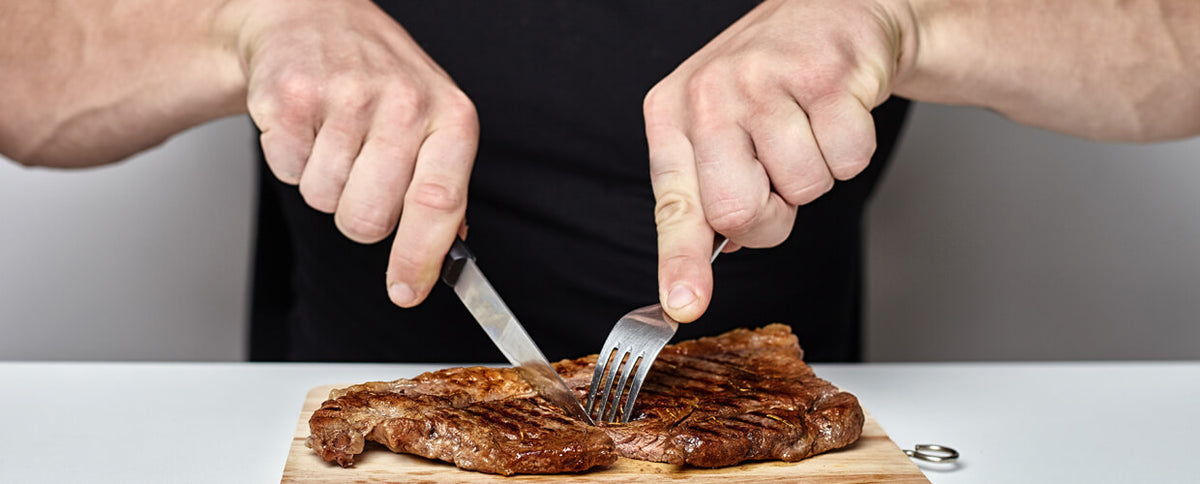Eating Too Much Meat: Is it Possible?

As an endurance athlete, you know you need more fuel than the average schmo to keep you going throughout the day, whether that day includes Bucket Brigade Training, a race, or needed recovery. Athletes require about 0.4 grams of protein per pound of body weight each day (about 55 grams of protein if you weigh 150 pounds), and protein or meat are efficient sources. A boneless 3.5-ounce piece of chicken or turkey contains close to 31 grams of protein, while the same amount of tempeh, a common plant-based source of protein, only contains about 18 grams. But should you worry about eating too much meat? While a debate still rages, as evidenced in a recent article in The New York Times, the short answer is: You won’t after reading this.
Eating too Much Meat: Should You Be Worried?
Meat’s Myriad Health Benefits
Incorporating chicken and other meat in your diet, as long as it’s of the lean variety, can supply you with the protein you need, along with a whole host of other vitamins and minerals.
Iron Especially found in red meat, you need iron for circulation: It’s a necessary component of hemoglobin, a protein that helps transmit oxygen to your muscles and tissues. Also, the higher your iron intake, the lower your chance of having anemia.
Zinc One standard serving of lean beef contains almost half of the daily zinc requirement. It’s essential to keeping the immune system up and running, which is especially important for endurance athletes.
Selenium This mineral is known for its anti-inflammatory effects. It’s key to warding off autoimmune thyroid disease and keeping your reproductive system functioning normally, research states.
B3 Also known as niacin, vitamin B3 helps lower your risk for cardiovascular disease and can also lower your cholesterol. B3 supplements are an option, but there’s an abundance of the vitamin in beef, too.
B5 You can take vitamin B5 (also known as panthothenic acid) supplements, but it’s also present in many animal products. It contributes to healthy hair and nail growth, as well as red blood cell production.
B6 Any athlete needs their fill of Vitamin B6; it helps regulate cell metabolism, giving you the energy to get you through a race.
B12 Vitamin B12 is crucial to blood cell and nerve cell health, as well as the creation of DNA in your cells. Animal products are among the only dietary sources of B12—otherwise, you’ll need a supplement.
Vitamins A, D, E, and K “Meats contain other nutrients, such as fat, and can provide fat-soluble vitamins such as vitamin A, D, E and K,” says Rebecca Goodrich, MS, RDN, LDN. “The fat content in food helps you feel satiated.” Because they are fat-soluble, these vitamins stay in your system longer.
Related: 9 High-Protein Breakfasts that Aren't Eggs
Red Meat: The One to Watch
It’s higher in saturated fat, so it can put you at risk for clogged arteries and heart disease if you overdo it, studies have shown. Cap your intake at 18 ounces per week to avoid raising your cancer risk, the American Society of Clinical Oncology advises. Dialing down your intake of red meat and replacing it with lean poultry, like skinless chicken and turkey, can lower risk, explains Goodrich. You can eat up to 6 ounces of lean poultry a day and stay healthy--as long as you’re not bathing it in heavy cream or frying it.
Why Processed Meats, Grilling and Smoking Aren’t The Greatest
Watch your intake of processed meats: sausages, bacon, hot dogs, and pre-packaged deli meats. Not only are they often high in saturated fat and sodium, but they could contain cancer-causing carcinogens, depending on how you cook them. “When meats are cooked at high temperatures through grilling, smoking, and deep-frying, cancer-causing particles can be found,” says Linzy Ziegelbaum, MS, RD, CDN.
Go ahead and dig into the occasional grilled burger or steak, but know that it’s best to bake meat, fish, and poultry in the oven rather than smoking them or frying them. Serve them with whole grains, fruits, and vegetables to balance the meal, Ziegelbaum says.
Related: 4 Healthy Grilling Ideas to Clean Up Your BBQ Game
Look For These Terms On Labels
Food labels can perplex, but the safest bet is certified organic meat. “It means that antibiotics and growth hormones were never used,” Goodrich explains. Bonus: Organic meats, dairy, and eggs tend to be higher in omega-3 fatty acids compared to conventional products, Goodrich says.
Also, consider the diet the animal was raised on before purchasing, particularly if you’re buying red meat. “The best choice is meat from grass-fed cattle, which have healthier fat profiles,” Ziegelbaum says. Meat from grass-fed cattle also has more omega-3’s, credited with lowering inflammation.
The bottom line when it comes to meat--and protein sources overall--is to vary your sources to maximize the benefits while minimizing negatives. “You should include a variety of proteins in your diet, such as lean beef, pork, chicken, fish, beans, lentils, eggs, and nuts,” says Ziegelbaum. As an athlete, you want to reap as many nutrients as possible from a variety of protein sources. Your performance depends on it.



